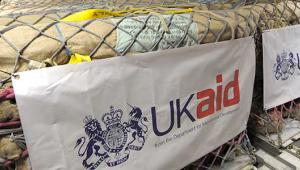A Conservative report, backed by former foreign secretary and MP Boris Johnson, suggested the UK should be freed to define its aid spending, without constraints by the international aid rules set by the OECD.
The vision for a post-Brexit “global Britain” suggested that more aid budget – which totalled £13.4bn in 2016 – should be channelled through the Foreign Office and the Ministry of Defence, with the closure of DfID as a separate entity within Whitehall.
The report, published yesterday, was drawn up by Bob Seely, a Tory member of the foreign affairs select committee and James Rogers, a strategist at the Henry Jackson Society think-tank. Boris Johnson, who wrote the foreword to the report, says the plans were “hard to disagree with”.
But NGOs have criticised the proposals. Oxfam’s head of government relations, Jon Date, said: “Redefining Britain’s aid budget in this way would be a recipe for disaster.
“The primary purpose of aid is – and should continue to be – to fight poverty. Any other approach risks aid being spent badly and jeopardising the lives of the world’s most vulnerable.”
He added that abolishing the aid department and rejecting global aid rules would be “self-defeating”.
The Foreign & Commonwealth Office would become the “undisputed intellectual driver of global engagement”, according to the report’s vision, which will be fed into a Foreign Office review on what a post-Brexit Britain will look like.
It said current aid definitions would be broadened to include peacekeeping, and the BBC’s World Service would be expanded.
Save the Children warned that if DfID was “swallowed up” by the FCO, the UK would “lose its status as an international development superpower”.
Romilly Greenhill, UK director of The ONE Campaign, also echoed this and said Britain is a “superpower” for a reason. “Our aid yields extraordinary results for the world’s poorest people, as well as boosting the UK’s soft power – let’s not risk this.”
In a report earlier this month, ONE warned that the FCO was one of the “worst performers” on aid quality in the UK, while DfID was the best. Greenhill said: “Putting the FCO in charge of DFID would be like putting the fox in charge of the henhouse.”
The report said: “The government should cap the total amount of spending on 'international development' – inclusive of overseas development assistance – at 0.7%. Ultimately, this target should remain only provided the UK gains the freedom to define aid as it sees fit.”
The UK currently spends 0.7% of gross national income on overseas development assistance. This is an international commitment and enshrined in law.
Penny Mordaunt, the secretary of state for international development, reportedly told colleagues earlier this month that the 0.7% target was “unsustainable”. She has also proposed plans to change rules on aidto include millions of pounds from private investment.
MPs have in the past called for UK overseas development assistance to be more focused on helping the world’s poorest people.







